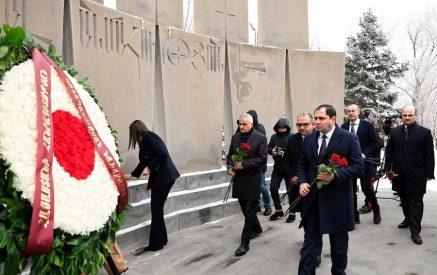by The Armenian Mirror-Spectator
By Greg Vartan
Every April 24, Armenians around the world pause to reflect on a truth that has shaped our identity, values, and now, for me, my race for Congress: the Armenian Genocide was not only a crime against our ancestors — it was a crime against humanity.
Between 1915 and 1923, 1.5 million Armenians were systematically murdered by the Ottoman Turkish government in what became the first genocide of the 20th century. My great-great-grandfather, Stepan Sapah-Gulian, survived not by fleeing, but by resisting. A political leader and editor, he was condemned to death in absentia and ultimately sought refuge in the United States, where he continued his fight for truth and justice in Providence and later New Jersey.
Read also
I’m running for Congress with his legacy close to my heart — and with a deep sense of duty to ensure that America not only remembers the Armenian Genocide, but works to prevent future atrocities, holds perpetrators accountable, and educates the next generation.
That’s why I would proudly champion the Armenian Genocide Education Act, introduced by Congresswoman Dina Titus alongside Representatives Gus Bilirakis, Ted Lieu, and David Valadao. This bipartisan bill directs the Library of Congress to launch a national education program about the genocide perpetrated by the Ottoman Empire against Armenians and other Christian minorities. It allocates $10 million over five years to develop curriculum, train teachers, and bring this history into classrooms across the country.
This isn’t just a good bill. It’s a necessary one.
We cannot protect democracy if we fail to understand the truth. We cannot say “never again” if we don’t teach what happened the first time. That’s why Holocaust education has been so vital: it ensures we pass down the collective pain and lessons of the past to prevent future atrocities. The Armenian Genocide deserves the same commitment to remembrance, education, and truth.
Genocide denial isn’t a relic of the past — it persists today. It thrives in silence, ignorance, and geopolitical convenience. And as we mark the 109th anniversary of the Armenian Genocide, Armenian POWs remain unlawfully detained by Azerbaijan following the forced depopulation of Artsakh (Nagorno-Karabakh). Families are torn apart. Cultural sites are desecrated. And the international response has been tepid at best.
Let me be clear: we need voices in Congress who won’t mince words or hide behind euphemisms. What happened in 1915 was genocide. What’s happening today in the South Caucasus is ethnic cleansing. And when a people who’ve endured genocide are once again being targeted, the US must act.
I will fight for legislation that educates future generations and pressures Azerbaijan to release all Armenian POWs, stop cultural erasure, and face consequences for violating international law. I will stand with Armenian-American communities to ensure US policy reflects our values—not transactional diplomacy.
And I’ll do so not just as a politician, but as the proud descendant of a man who gave everything to make sure his people were not forgotten.
Stepan Sapah-Gulian was born in 1861 near Nakhichevan. He traveled the Ottoman Empire, directed Armenian schools, studied in Paris with future French Prime Minister Raymond Poincaré, and edited revolutionary publications like Yeritasard Hayastan. His mission was clear: awaken the world to Armenian suffering and demand justice.
Today, I carry that mission forward in my own way.
I was born and raised in Summit, New Jersey. I served on our First Aid Squad and led our City Council through challenges like the COVID-19 pandemic. My dad works for Guardian Life. My mom is a secretary at my old elementary school. I’m the first in my family to graduate college. And now I’m running for Congress to make sure families like mine can still build a future here.
But I’m also running to make sure families like my great-great-grandfather’s are never forgotten. Because justice delayed is justice denied — not only for Armenians, but for all persecuted peoples.
The Armenian Genocide became a template for others. Hitler infamously justified his crimes by asking, “Who, after all, speaks today of the annihilation of the Armenians?” We must answer — with our voices, our votes, and our laws.
On April 24, I will remember the martyrs of 1915. I will honor the courage of survivors like my ancestor. And I will recommit myself to ensuring this history is not only commemorated, but confronted — with policy, advocacy, and resolve.
We cannot change the past. But we can shape the future. I intend to do just that.



























































